How the CID ‘Grilled’ a Journalist on the 4th Floor
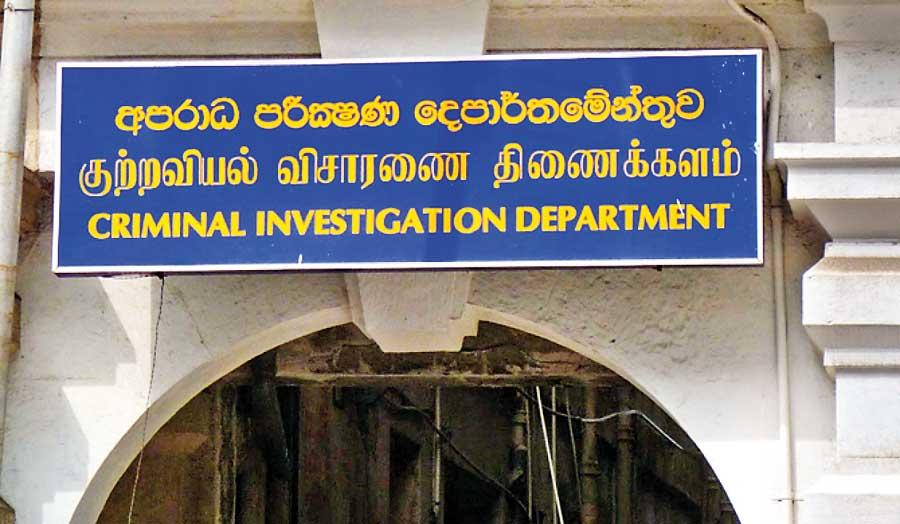
- As a journalist, I was very eager to file news reports from Jaffna about the resumption of war. I had first requested the then Jaffna GA M. Panchalingam to help me send despatches. He regretted his inability. I then asked the Red Cross authorities to no avail
- The “good cop bad cop” method of one person being sympathetic with another being hostile was adopted during questioning
- it was clear to me that the so-called questioning was at best a subterfuge to keep me in detention for a long time. It appeared like a filibustering ploy aimed at preventing my writing further on the situation in Jaffna
The first and second parts of this article published on 14 and 21 October respectively narrated the story of how I was arrested by the CID in October 1987 and detained on the 4th floor for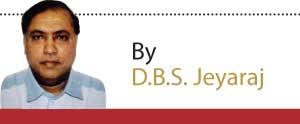 having exposed the realities of the war between the Indian Army under Indian Peace Keeping Force and the Liberation Tigers of Tamil Eelam (LTTE) in Northern Sri Lanka.
having exposed the realities of the war between the Indian Army under Indian Peace Keeping Force and the Liberation Tigers of Tamil Eelam (LTTE) in Northern Sri Lanka.
In this third part, the focus will be on how I was interrogated by the CID while being held on the infamous fourth floor.
At the outset, I wish to state that I have been pleasantly surprised by the positive response shown towards the previous articles by readers.
The feedback I have been receiving indicates that readers want to know in greater detail about these happenings as opposed to the mere recording of facts.
Also, some Human Rights activists have evinced interest in gaining further insight into the relationship that prevailed between the Police and the press those days.
It is against this backdrop therefore that I continue relating my experience of being ‘grilled’ by the CID on the 4th floor.
The interrogation and recording of my statement was tedious and I do not intend writing too many boring details about it. When I was first brought to the CID headquarters, I had been shown a letter by CID Director DIG Bennet Perera. This letter was from the then Defence Secretary Gen. Sepala Attygalle instructing the Police to question me regarding the killing of four Rupavahini employees by the LTTE.
Strangely enough, only one question was put to me about the killing of the Rupavahini crew at Maruthanarmadam Junction in Jaffna.
This defeated the ostensible purpose of my detention which was to find out more details about that particular incident.
Assistant Superintendent of Police Vitharana and Police Inspectors Nimal Wakishta, Palitha Perera and Piyatissa were involved in the interrogation although all of them were not present at all times.
Inspectors Nimal Wakishta and Palitha Perera were two of the three cops who had posed as JVP members to me when I was arrested.
The ‘grilling’ if one may call it was quite courteous and violence or the threat of violence was not used at any time.
Since my position was that I would have been most willing to provide a statement short of divulging my sources, I too co-operated to a great extent.
The “good cop bad cop” method of one person being sympathetic with another being hostile was adopted during questioning.
At times the person adopting the hardline tended to be rudely offensive. These were but a few digressions but the general trend of the questioning was comparatively decent.
My Journalistic Duty
The general statement recorded was mainly about my journalistic career. Various articles written by me at different times in journals such as The Island, Sunday Times, The Hindu, Frontline, and Saturday Review were shown to me.
I was asked as to whether I had written them in spite of my by-line appearing on them. Then I was asked as to why I had written them to which my stock reply was ‘My journalistic duty’.
This was followed by discussions on the merits of the articles.
I was also asked in detail about my trip to Jaffna and virtually all my movements there were queried about and recorded.
They were very eager to know where exactly in Jaffna I met the then LTTE deputy leader Mahathaya and when I told them that I met him in the LTTE office at Thirunelvely they were utterly sceptical saying it was impossible for the LTTE deputy leader to be in the office at a time when fighting had broken out between the Indian Army and the Tigers.
I explained that at the time I met Mahathaya, Jaffna town and suburbs had not fallen to the Indians and the Tigers were freely moving about there.
There were also a lot of questions about whether I was a member of the LTTE whether I was a JVP sympathiser and also whether I advocated a LTTE-JVP tie-up. I denied all these accusations categorically.
Interestingly I was asked why I wrote about the LTTE in the newspaper. I replied saying that it was my editors in The Island who had assigned me what was considered the Tamil beat or round which was mainly about Tamil affairs.
I explained that I was reluctant to do so at the beginning as it was a messy area.
My editors persuaded me to accept it and once I took over the round, I treated it as a challenge and engaged in my work wholeheartedly I said. 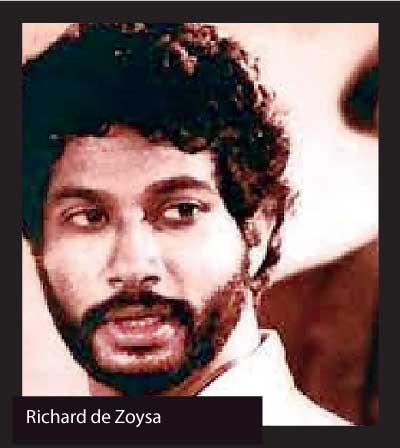
As the ethnic crisis intensified the Tamil round moved from the wings to centre stage and I too began to enjoy a lot of prominence in the paper as the person writing about Tamil matters.
I now liked what I was doing very much, I told the Policemen. I also said that many knowledgeable media commentators had praised me for introducing a qualitative change in writing about Tamil affairs.
After the 1983 violence, my commitment to a peaceful settlement of the Tamil national question increased I stressed.
I also told my interrogators that a certain level of contact with the people one writes about was necessary and that I maintained relations with all shades of political opinion for that purpose.
This included the LTTE, TULF, Tamil Congress, and Tamil groups, such as the PLOTE, TELO, EPRLF and EROS. (There was no EPDP or TNA then). This did not mean that I subscribed to their political views, I took pains to explain.
I also had contacts among Sinhala and Muslim political leaders as well as senior Police and Army officers. This goes with the journalistic territory, I pointed out.
Two Prickly Issues
Two prickly issues emerged during the interrogation. One was about meeting a reputed leader of a movement proscribed as a terrorist.
This was considered an offence under the Prevention of Terrorism Act (PTA.) The second was about transmitting my news despatches through the LTTE communication system to Madras. These dispatches were then sent to the Hindu and The Island.
As far as the first issue was concerned my reply was a reiteration of my earlier position namely that it was part of my professional duty as a journalist.
There was nothing clandestine in my motives and I had in practice made a public declaration of the meeting in question by publishing the Mahathaya interview in full in The Island.
On the second issue, I explained that all public communications with Colombo had been cut off after the outbreak of war.
There was no road or rail transport. Long-distance telephone services were curtailed to the general public.
As a journalist, I was very eager to file news reports from Jaffna about the resumption of war. I had first requested the then Jaffna GA M. Panchalingam to help me send despatches. He regretted his inability. I then asked the Red Cross authorities to no avail.
Then I asked the Indian Army officials through a Jaffna citizen’s committee member whether I could transmit my copies through their communication network. The request was also turned down.
At this point, Mahathaya offered to send it through the LTTE communication system to Madras.
I took the risk and grasped his offer. I realised that Mahathaya had a vested interest in getting the news through as it was advantageous for the LTTE to get the news published. I was not concerned about whom the news would benefit and was interested in only getting the news across. In any event, India was allowing the LTTE Madras office to function openly so I did not see anything wrong in using the LTTE communication network for my purpose.
My interrogation proceeded intermittently in an unhurried, leisurely pace.
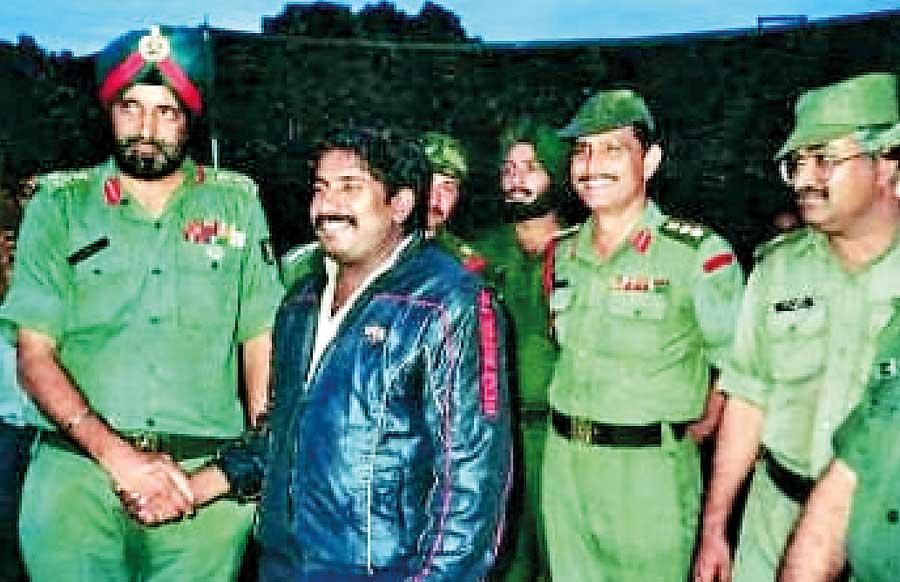
Mahathaya with IPKF Officers
Living Conditions Improved
In the meantime my ‘living conditions’ improved.
I had been allowed sarongs, changes of clothing, towels, soap, talcum powder, toothpaste, and brush. From Wednesday (28) I was also given a copy of the Daily News but no Island, my own paper. Someone had brought John Le Carre’s The Spy Who Came In from the Cold which I re-read avidly in the night.
I was also allowed a bedsheet and pillow on Thursday (29). I continued to sleep on the table and bathed early in the morning using the washroom taps.
The Policemen however were kind enough to give me a clean, new bucket for bathing. This was being used by JVP suspects detained in a cell on the same floor.
However, I was still not allowed to see any visitors or receive food from outside. So it was routine food. 10 string hoppers, sambol and Sodhi in the morning; plain tea and small plantain at 10.30 am; rice parcel with fish at noon. Milk tea with tiffin in the evening; rice parcel with beef at night.
I was however allowed chocolates and biscuits with their wrappers torn. I received a lot of these from friends and shared them with friendly Policemen and the JVP suspects.
Visitors not Allowed
The Policemen on duty were generally friendly. They said that a great deal of people were coming to the CID wanting to see me.
They were not allowed to see me. The cops did not reveal the names of the would-be visitors but some of them were excited by the visit of well-known media personality and friend Richard de Zoysa and said to me with awe “So you know Richard.”
Another Policeman was thrilled when my friend the renowned film-maker Vasantha Obeyesekera came to see me.
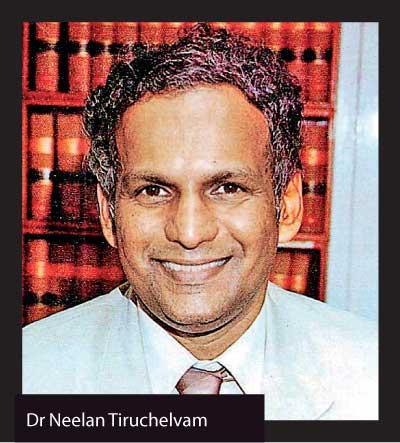 One Policeman said that he had not experienced so many visitors, almost all of them Sinhalese coming to see a Tamil Tiger suspect in custody.
One Policeman said that he had not experienced so many visitors, almost all of them Sinhalese coming to see a Tamil Tiger suspect in custody.
Another reassuring feature was the inquiries made by several Police officers about my welfare from the Policemen in Charge.
A few of them came in person and met me unofficially for a few minutes and made sure that everything was all right with me. Most of them were not known to me.
It was only after my release that I fully realised what had happened.
Many of my journalist colleagues from Upali Newspapers as well as other newspapers had been regularly calling the Police and inquiring about me.
The reporters covering the Police round like Jehan Haniff, Norman Palihawadane and Stanley Premaratne from the Upali Group were requesting their Police contacts to personally ensure my well-being.
At another level, a large number of friends and concerned individuals from the media, Human Rights organisations, research and academic institutions were calling frequently in small groups on the 4th floor demanding to see me. Although they were not allowed to see me they marked their presence by leaving behind eatables.
Richard and Vasantha as mentioned earlier were among them. I am not mentioning the others as they are too numerous to remember and I may inadvertently omit a few names.
Dr Neelan Tiruchelvam
Apart from my journalism, I was also attached as a research fellow to the Colombo-based research institute The International Centre for Ethnic Studies (ICES) at the time of my arrest.
The director of the ICES was Dr Neelan Tiruchelvam, who was always a ‘friend, philosopher and guide’ to me.
Upon hearing of my arrest, he cancelled a trip to Singapore and stayed behind to watch my interests.
Due to Neelan’s efforts Upali A. Gooneratne, the then Secretary of the Bar Association of Sri Lanka (BASL) volunteered to be my lawyer.
Also, H.L de Silva the President of the BASL agreed to file a FR petition seeking a writ of Habeas Corpus on my behalf.
Filing an FR petition became unnecessary because I was produced in courts before such a move.
Human Rights lawyer Prins Rajasooriya also involved himself on my behalf at the request of my father who was a close friend of his.
Upali Gooneratne
On Thursday the 29th I was taken to the CID Director Bennet Perera’s office again. I was told that I was being held incommunicado under the Emergency Regulations and that I was not permitted to consult a lawyer.
But Mr Upali Gooneratne would be allowed to see me and ascertain for himself that I was all right.
We would not be allowed to talk to each other. Mr Gooneratne came in and we smiled at each other. That was the end of the meeting.
By this time it was clear to me that the so-called questioning was at best a subterfuge to keep me in detention for a long time. It appeared like a filibustering ploy aimed at preventing my writing further on the situation in Jaffna.
I had been earlier interviewed by the Canadian Broadcasting Corporation (CBC) on its ‘As it happens’ programme where I had described in detail what was happening in Jaffna.
Thereafter Indian High Commissioner J.N. Dixit had been interviewed and he had denied everything and accused me of being an LTTE publicist.
It was in the Indian interest to keep me gagged journalistically for a while. Although as the Hindu correspondent in Colombo, I had been very friendly, with the Indian diplomats the situation was different now.
During my interrogation, I had established a very good rapport with a Police officer whose name I pointedly refrain from mentioning.
He seemed very hostile to the Indian Army’s presence in Sri Lanka and told me “When brothers have a quarrel you must not go to a third party. See what is happening now”.
The idea is to Keep You Quiet
My worst fears were confirmed when this Police officer told me confidentially ‘The whole idea is to give you a knock and keep you quiet until the Indian Army finishes its task of wiping out the Tigers.’
I said that it was going to be protracted warfare and not a swift, surgical strike as anticipated and asked him whether I was going to be detained throughout the conflict.
He grimaced and said, “looks like it”.
He also said that while I had been detained under emergency regulations there was every possibility that I would be charged in court under the Prevention of Terrorism Act (PTA).
This was indeed bad news but fortunately, I was not charged under the PTA. Instead, I was produced in court and released on bail pending further investigations.
How and why this happened will be related in the fourth and final part of this article next week.
D.b.S.Jeyaraj can be reached at dbsjeyaraj@yahoo.com





